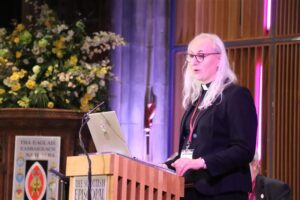On the final day of General Synod 2025, members backed a motion which affirmed transgender, non-binary, gender non-conforming and intersex people withing the Church after an often emotional but always respectful debate at St Paul’s & St George’s Episcopal Church in Edinburgh.
Specifically, the motion affirmed that trans+ people are made in the image of God, are loved by God, should be accorded the same dignity, respect and rights as cisgender people, and can and should participate fully in the life, worship, mission and ministry of the Scottish Episcopal Church.
Bringing the motion to Synod, the Rev Amy Jo Philip described the experience of trans+ people since the recent Supreme Court ruling that a woman is defined by biological sex under equality law, saying: “The SEC welcomes you. We are all familiar with this phrase. We all assent to it, we want to live it. Trans+ and intersex people are however fearful about where we are welcome. We always have been and we are even more so since the Supreme Court ruling.
“But God is love and there is no room for fear in love.
“Are we welcome in the SEC? I know I am, personally, but are my trans siblings? And moreover, do they know it?
“This motion is about making that welcome clear.”
 Rev Amy Jo, pictured, highlighted that trans+ people are among the most marginalised groups in society, facing higher rates of violence, personal crime and domestic abuse, lower employment rates and lower pay than cisgender (non-trans) people.
Rev Amy Jo, pictured, highlighted that trans+ people are among the most marginalised groups in society, facing higher rates of violence, personal crime and domestic abuse, lower employment rates and lower pay than cisgender (non-trans) people.
“All we are asking for is to be treated as humans,” she said.
Among a host of comments from the floor, the motion was backed strongly by Bishop Ian Paton, Diocese of St Andrews, Dunkeld & Dunblane, who said in an impassioned address: “Calm heads are needed on all sides. The hatred and the toxicity we are seeing in public debate about this is creating even more fear for the trans+ people whose lives are being put in the centre of highly politicised culture wars.
“But surely as Christians serving the God who made all humankind in the divine image, in whom there is neither male nor female, we are called to show a different way which is why I am supporting this motion and I urge you to do the same.”
A counter motion was proposed by the Rev Amanda Fairclough, Diocese of Argyll & The Isles, who suggested that the matter should not be addressed by Synod but should instead be sent to dioceses for discussion, citing the need for debate to be deep, wide-ranging and open, and without the relatively limited amount of time allocated by Synod.
She said: “We are the Scottish Episcopal Church. We can work through contentious issues. We’ve proved it in the past. We don’t necessary need all to agree. But Synod, I beg you to let all of us have the time and space to have an honest debate in an appropriate setting.”
The counter motion fell, as did an amendment proposed by the Rev Jaap Jacob, Diocese of Brechin, leaving Synod to carry the full motion proposed by Rev Amy Jo, with 92 votes cast for the motion, 12 against, and five abstentions.
Day Three of General Synod 2025 had started with a session on Assisted Dying, led by the Rev Dr Hamilton Inbadas.
The session took the form of a presentation delivered by Dr Inbadas, who is a former palliative care chaplain with a specific academic interest in spiritually at the end of life and end of life studies.
Dr Inbadas led Synod through the history of social attitudes to death, from the neolithic age to present day, and the role of medicine in providing comfort to the sick – acknowledging that some consider comfort to be palliative care, and others define its as providing assistance in death.
 The presentation outlined the progress of the Assisted Dying Bill Scotland 2024, and the consultation response made on behalf of the Church In Society and Doctrine committees, which made clear that the overall view of the Scottish Episcopal Church had not yet been established. The submission had recorded partial opposition to the Bill, based on concern over the sanctity of life, risk of coercion of vulnerable people, and risk of eligibility being broadened and safeguards being reduced over time.
The presentation outlined the progress of the Assisted Dying Bill Scotland 2024, and the consultation response made on behalf of the Church In Society and Doctrine committees, which made clear that the overall view of the Scottish Episcopal Church had not yet been established. The submission had recorded partial opposition to the Bill, based on concern over the sanctity of life, risk of coercion of vulnerable people, and risk of eligibility being broadened and safeguards being reduced over time.
Dr Inbadas, pictured, reminded Synod members that “euthanasia does not stop at the church door” and offered his opinion that the Bill – which he described as ‘physician assisted suicide’ – is likely to pass into law, and that the Church needs to equip itself for that prospect as a welcoming and inclusive church, serving everyone with respect and compassion, and one with experience of handling sensitive issues well. As ways of achieving the necessary level of preparedness, Dr Inbadas suggested that clergy and laity could be given training, and that a fresh look be taken at the Church’s pastoral offices,
The discussion then continued at table groups, with feedback to be collated. No motion was presented on assisted dying, and therefore no vote taken.
After a series of elections to various positions, the meeting was brought to a conclusion with the closing act of worship and confirmation of the Acts of Synod.

